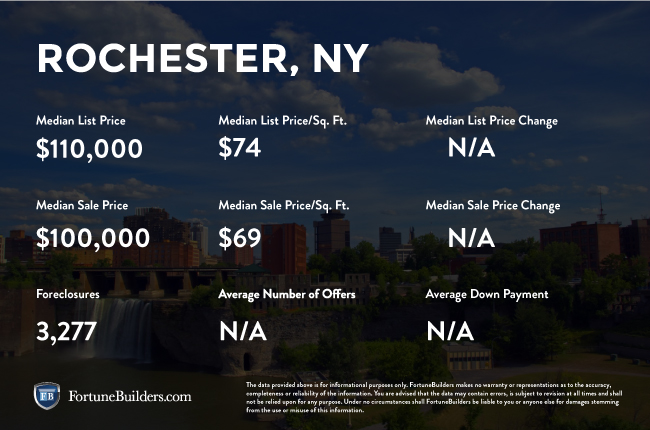The median home price in the Rochester real estate market was $134,600 during the second quarter, compared to the national average of $239,167. While prices are still down from a year ago, the trend is improving. In fact, gains in the last three years have extended the trend of positive price growth after the recession. Home affordability for the Rochester housing market is far superior to the national average, which bodes well not only for homeowners and investors, but renters as well. That said, the Rochester real estate market could see a dramatic influx in investor activity in the second-half of 2016.
Rochester, NY Real Estate Market Statistics:

With home prices falling below the national average, home appreciation continues to follow suit. Unlike other real estate markets such as San Diego, Portland and Las Vegas, which have accrued massive equity gains in 2016, the Rochester real estate market continues to see minimal gains. In fact, the one-year appreciation rate for Rochester real estate was -0.1 percent during the second quarter, as opposed to the national average which saw rates as high as 4.9 percent. The good news, however, is low prices could spur Rochester real estate investing in the second-half of 2016. For those considering Rochester real estate investments, the following provides a breakdown of appreciation rates in previous years:
- Homes purchased in the Rochester, NY housing market one year ago have appreciated, on average, by $943. The national average was $14,963 over the same period.
- Homes purchased in the Rochester, NY housing market three years ago have appreciated, on average, by $9,829. The national average was $46,878 over the same period.
- Homes purchased in the Rochester, NY housing market five years ago have appreciated, on average, by $19,536. The national average was $82,353 over the same period.
- Homes purchased in the Rochester, NY housing market seven years ago have appreciated, on average, by $26,978. The national average was $77,054 over the same period.
- Homes purchased in the Rochester, NY housing market nine years ago have appreciated, on average, by $28,575. The national average was $31,126 over the same period.
Total equity gains for Rochester real estate remain lower than most of the real estate markets. In fact, Rochester real estate purchased one year ago has only gained $943 in total equity, which is vastly below the national average of $14,963. Although equity is far below the rest of the country, appreciation for the Rochester real estate market should pick up in the second-half of 2016.
As of August 2016, there are currently 3,879 properties in the Rochester, New York area in some stage of foreclosure. According to RealtyTrac, the number of Rochester foreclosures in the month of August was 30 percent higher than the previous month and 56 percent higher than the same period in 2015. The number of REO properties in Rochester increased 1.5 percent from the previous month and 26.4 percent from the same time last year. That said, Rochester real estate investing should pick up in the years to come.
Rochester, NY: Real Estate Market Summary:

- Current Median Home Price: $134,600
- 1-Year Appreciation Rate: -0.1%
- 3-Year Appreciation Rate: 2.2%
- Unemployment Rate: 4.3%
- 1-Year Job Growth Rate: 0.3%
- Population: 210,358
- Median Household Income: $30,708
Rochester, NY: Real Estate Market (2016) — Q2 Updates:

Although home prices and appreciation rates have fallen flat, home affordability is surging. During the second quarter homeowners paid 6.2 percent of their income to mortgage payments, while the rest of the country paid 15.8 percent. That’s even lower than its historical average of 8.7 percent, which means the Rochester housing market is more affordable than most. In addition, new housing construction is on the rise, which could further benefit the Rochester housing market in terms of affordability. The current level of construction was 50.3 percent during the second quarter of 2016, while single-family housing permits skyrocketed to 27.7 percent, compared to the national average of 10.6 percent. That said, construction is on the rise relative to last year, suggesting the local inventory has stabilized.
Another component Rochester real estate investors and homeowners should be aware of is the local economy. Unemployment remains better than most markets, as the second quarter saw unemployment drop to 4.3 percent, compared to the national average of 4.9 percent. However, job growth continues to sink as one-year growth was 0.3 percent during Q2, compared to 1.9 percent the rest of the country experienced. Although New York’s economy is growing, the local economy in Rochester is poor and needs to improve in the second-half of 2016.
Moving forward, the Rochester real estate market is expected to grow consistent with the national average in the second-half of 2016. The National Association of Realtors (NAR) has forecasted slightly lower price growth in Rochester than in the U.S. in the next 12 months, with price expectations for Rochester real estate anticipated to grow by 3.3 percent in the second-half, as opposed to the national average of 3.6 percent. Despite lower-than-expected home prices, appreciation and the local economy, the optimism of the Rochester real estate market is beaming.
